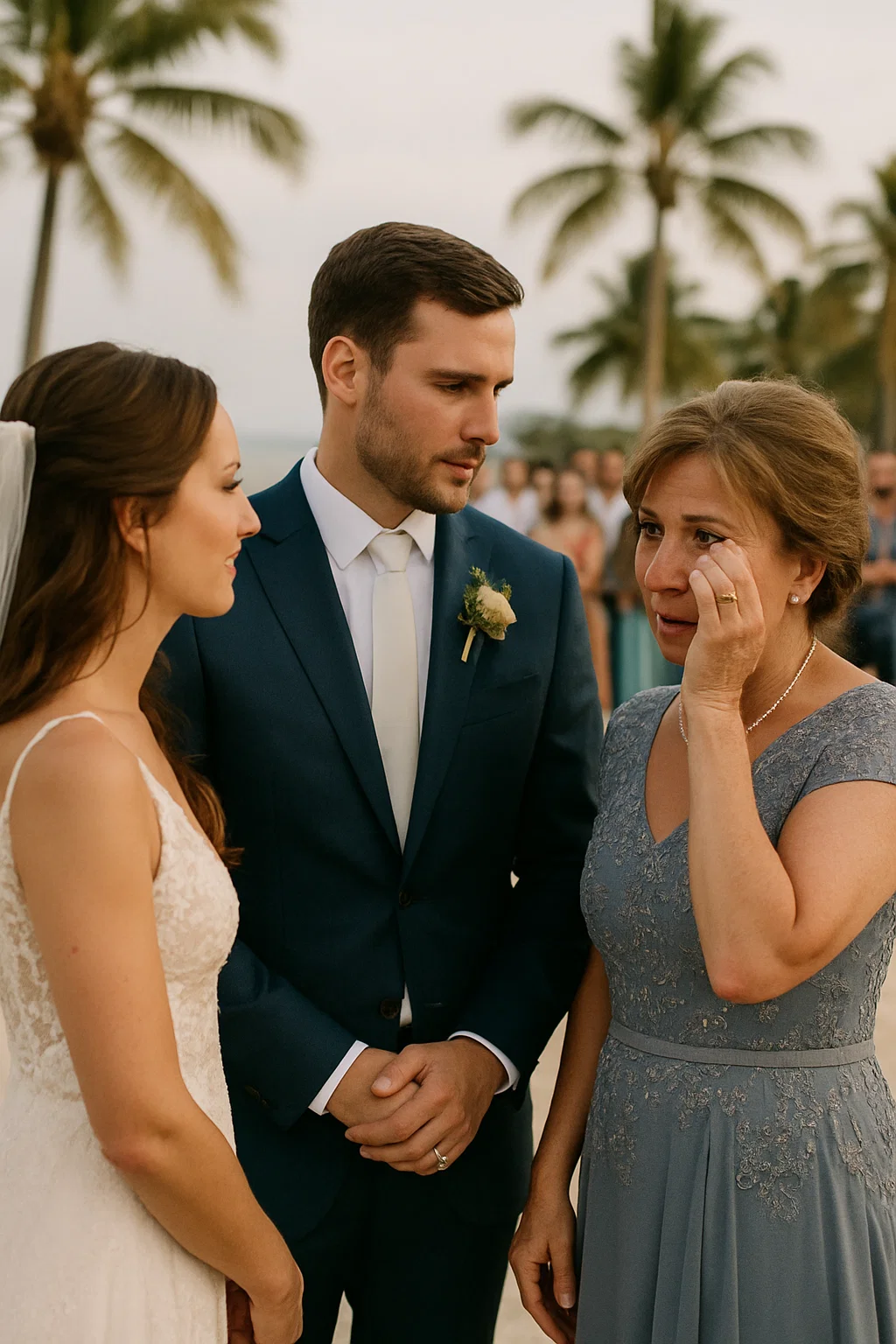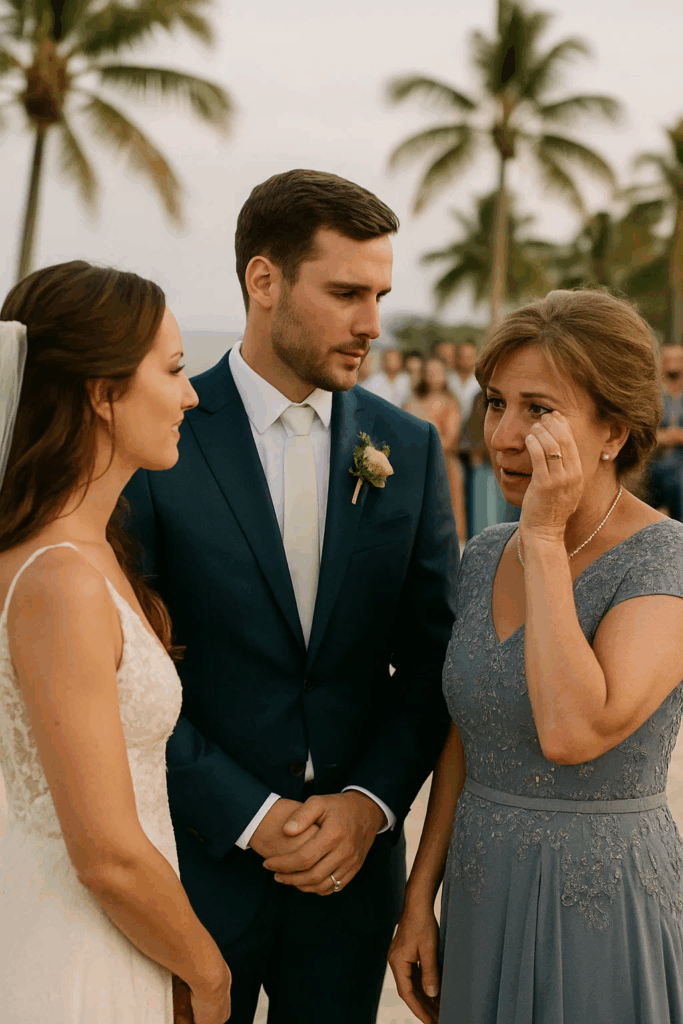At my daughter’s seaside wedding, her groom leaned in with a smirk.
“Fifty grand,” he murmured, “or you vanish from our lives.”
My daughter clinked her champagne glass, eyes sparkling with cold amusement. “Or spend the rest of your years alone. Your decision, Mom.”
I raised my own glass, letting a slow smile curl my lips—a smile I hadn’t worn in decades. “You overlooked something,” I whispered. Their faces blanched. The tide was already shifting.
The ceremony had been picture-perfect—sunset spilling molten gold across the Cape Cod shoreline, lanterns glowing against the dusk. Yet beneath the romance lurked rot. Rachel and her polished new husband looked like they belonged on a glossy magazine cover: flawless, poised, untouchable. They thought I was powerless. Disposable.
But I was no longer the woman they imagined. Hardship had honed me into something unbreakable. And I had prepared for this moment.
“Something you forgot,” I murmured again, my words carried by the ocean breeze. Then I excused myself, poised and calm, while they remained unaware that the avalanche had already begun.
I was twenty-eight when I first chose survival over ruin. Rain hammered the streets of Boston that night. Inside our crumbling apartment, the silence was heavier than the storm. My husband lay passed out on the couch, reeking of alcohol and rage. My cheek throbbed from his hand. In the hallway, four-year-old Rachel clutched her ragged bunny, her eyes hollow in a way no child’s should ever be.

That broke me. Her quiet hurt more than my bruises. I packed quickly: a few clothes, passports, the $237 hidden in a hollowed-out book. When I lifted her into my arms, she whispered, “Is this an adventure, Mommy?”
“Yes,” I told her softly. “The greatest one yet.”
And into the night we slipped.
The years that followed were brutal but free. A borrowed sofa. A one-room flat that smelled of boiled cabbage but promised peace. I juggled three jobs—waitressing, phone duty, cleaning offices at midnight. Exhaustion was constant, but Rachel was safe.
She blossomed. When Boston University accepted her, she danced barefoot in our tiny kitchen, light flooding her face. I took on extra shifts to cover what her scholarship couldn’t. Every sacrifice felt worth it.
After graduation, she dreamed of opening her own boutique. One late call came—her voice full of tremor and hope. Ninety-seven thousand dollars. I handed over my retirement savings. But quietly, with my friend Sarah’s counsel, I retained majority ownership.
“Rachel’s Closet” began modestly. Then one influencer post made her designs go viral. Soon the store thrummed with customers. Rachel proclaimed she had built it “from scratch.” I swallowed the sting, erasing myself from her narrative.
Then came David Harrington—wealthy, smug, entitled. He swept her into his gilded circle. I learned of their engagement through Facebook. A stray message revealed the plan: squeeze me dry, erase me, cast me aside after the wedding.
They thought I was naïve.
So when David leaned close on that Cape Cod beach and demanded $50,000, I was already steps ahead. I slipped away to a quiet alcove, texted Sarah one phrase: Sand castle time.
The dominoes toppled within minutes. Investors received sealed envelopes: audits, account freezes, evidence of siphoned funds. Vendors were warned. Phones buzzed, panic spread, David’s father erupted in fury.
Rachel came running, eyes wide. “Mom, what’s happening? Stop this madness!”
“Not madness,” I replied evenly. “Truth. I’ve reasserted my rights as majority owner.”
David spat, “You’ve destroyed everything.”
“No,” I said coolly. “You did, funneling money into side deals. Now you face the consequences.”
Rachel sobbed. “Please, Mom! I’m your daughter!”
“And I loved you enough to give you everything,” I answered. “But tonight, you showed me what I am to you. I believe you.”
I turned and walked away, leaving them to choke on their ruin.
With Sarah, I built anew. A small shop in Rockport—Harbor & Home. I painted the walls myself, stocked shelves with thrifted treasures and handmade goods. Locals wandered in, then stayed. Soon the space rang with laughter, poetry nights, and friendships.
For the first time, I wasn’t just someone’s mother, someone’s backup plan. I was myself. Whole.
Months later, Rachel appeared on a stormy evening. Gone was the polish. Her coat was damp, her eyes hollow. “David left. I have nothing. No home. Please, Mom.”
My arms longed to hold her, but I remembered the betrayal. “You had a place,” I said softly. “You set it on fire.”
Tears streaked her cheeks. “I thought erasing you would prove I was strong. I didn’t see the harm I caused.”
“No,” I corrected. “You chose not to see.”
She begged for another chance. I gave her an address—a shelter. “If you want change, begin here. I won’t carry you anymore, but I won’t let you drown.”
Her voice cracked. “Do you still love me?”
“Always,” I said. “But love isn’t blindness. Love is truth. And the truth is—you must rebuild yourself.”
Time passed. I heard whispers of her working at a thrift store, attending therapy, piecing life back together. She never returned, but I didn’t chase her. My love no longer meant sacrifice. It meant distance, space, and truth.
And I flourished too. My shop thrived—tourists and locals alike filling it with warmth.
One year after that fateful wedding, a small envelope arrived. No return address. Inside, a Polaroid: Rachel, wearing a paint-stained apron, standing in front of a modest apartment, weary but smiling. On the back, four words:
Building from nothing, Mom.
I pressed it to my chest and breathed deeply. The Cape Cod waves no longer carried malice—just the endless rhythm of the sea.
And I was finally free.


